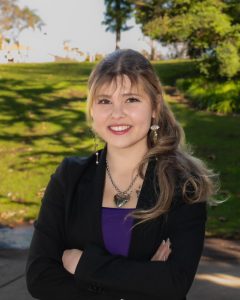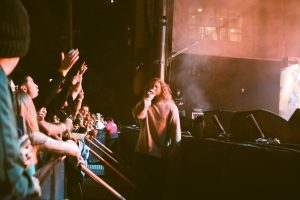The U.S is notoriously associated with freedom. The national anthem touts the U.S. as being the “land of the free,” the Pledge of Allegiance swears loyalty to a nation based on “liberty and justice for all,” and the Statue of Liberty asks for “your tired, your poor (and) your huddled masses yearning to breathe free.”
There is a Wal-mart about five miles away from the Statue of Liberty and if you Google “dollar stores near Liberty Island,” it looks like Google Maps has chicken pox.
In addition to being the “land of the free,” America is also the land of people who like to buy things for as close to free as possible.
But the dark underside to cheap products involves a world where producers are exploited and denied a fair, livable wage.
While college students are traditionally confined to small budgets, a few San Diego State students are agreeing to pay the extra pennies for equality and are working toward making SDSU a Fair Trade University.
Nursing junior Denise Thompson, who is a part of the SDSU Fair Trade movement, has posed the question, “What is fair trade?”
Fair trade is a certification process that works in developing countries to fairly compensate farmers, artisans, and workers and helps with community development. This alternative to traditional aid is meant to give small businesses the ability to flourish.
According to Fair Trade USA, “fair trade offers better prices, improved terms of trade, and the business skills necessary to produce high-quality products that can compete in the global marketplace.”
It does this by having importers work directly with small producers, thus cutting out some of the money that ends up in the hands of the middlemen. Fair-trade certification principles emphasize that producers form democratic co-ops, promote environmental sustainability and strictly prohibit child labor.
Fair Trade USA is a 501 (c) (3) nonprofit organization and is the main third-party fair trade certifier in the U.S. It certifies coffee, tea, herbs, spices, cocoa, sugar, fresh fruit and vegetables, beans, grains, nuts, oils, butters, honey, flowers, wine and apparel.
The organization has generated $225 million worth of additional income for farmers and workers since fair trade began in 1998.
Thompson often explains the income benefits to people, adding that, “the response is usually positive, but it’s not socially recognizable yet.”
Thompson says she’s taking steps to make the concept of fair trade as recognizable as the organic trend. She has spent the last two years working on converting La Mesa into a certified Fair Trade Town. La Mesa was awarded certification in October— Fair Trade Month—at the Fair Trade Campaigns Conference held in Chicago.
Thompson joined the SDSU Social Action Committee in September and presented the group with the idea of turning SDSU into a Fair Trade University. Her idea was acknowledged but with the November 2012 elections, the SAC was putting its resources toward registering voters and setting up an on-campus polling center. Now that the elections have passed, fair trade is at the top of the SAC agenda.
“It’s going to bring so much recognition to San Diego State,” Thompson said.
The process of certifying a university as fair-trade certified involves forming a committee, spreading awareness among students, faculty and staff, getting on-campus vendors to offer fair-trade options and writing a resolution.
“It’s about getting people to switch their consumer choice and switch every time,” Thompson said.
The committee plans to increase the fair-trade coffee available at the five Peabody’s Organic Coffee locations on campus.
Hopkins says she also hopes to have some sort of simple, succinct sign at the Peabody’s locations that defines what fair trade is in order to educate students. Apart from the administrative hurdles associated with SDSU becoming fair-trade certified, educating people is a major barrier.
The University of San Diego and the University of California, San Diego are already Fair Trade universities.
“When I was a student at USD, they started making the transition into fair trade,” USD alumna Meghan Avera said. “They did a great job of advertising to their students that the coffee we were drinking was fair trade. You can imagine on a college campus just how much coffee is consumed, so it was important for us to be conscious consumers.”
While molding college students into becoming “conscious consumers” is a goal of Fair Trade University certification, it can be challenging to educate so many people about a simple, yet relatively unknown, concept.
“Look for the labeling,” Thompson said.
Fair Trade USA uses two labels: one of a figure holding a container against a green backdrop and one of a black and white figure holding two containers. There are also fair-trade certification organizations in other countries that use different labels.
When she was working on converting La Mesa, Thompson ran into speed bumps associated with people not understanding the principles of fair trade. One misconception she noted is some people think fair trade takes away from American jobs. She explained fair-trade products need to be imported anyway, so it just means that the producers of American imports are treated better.
Another concern consumers have is higher cost. A 12-ounce cup of fair-trade coffee at Cosmos Coffee Café in La Mesa costs $1.50 while the same size at 7-Eleven costs $1.55 and is $1.65 at the SDSU Starbucks locations.
“People are working hard to be paid what they deserve,” Point Loma Nazarene University teaching graduate student Lisa Watson said. “No matter how much we work toward our own education, we should also be conscious of how we can help others.”
PLNU has also begun the process of becoming fair-trade certified.
Some SDSU students and alumni have already embraced fair trade in business models. SOLO Eyewear is a new company that was created in 2011 by graduate student Jenny Amaraneni. Purchasing bamboo sunglasses from SOLO helps raise money for those who cannot afford reading glasses and cataract surgery.
Another socially conscious business with roots at SDSU, VavaVida, sells made-in-the-U.S., organic, eco-friendly and fair-trade products. Its president, Antoine Didienne, received a Master’s degree in mass communication and media studies from SDSU and is an advocate for SDSU converting to fair trade.
VavaVida intern and SDSU marketing junior Angellyne De Perio has embraced the concept of fair trade since she learned about it at the beginning of her internship.
“I think (making SDSU a Fair Trade University) will be a big challenge because moving to fair trade is teaching a whole new behavior,” De Perio said. “However, I think that SDSU is moving in a great direction by doing this and that college is the prime time for learning new behaviors that shape us in the future. Becoming a fair-trade campus would show the world that SDSU is an institution dedicated to the global community.”









